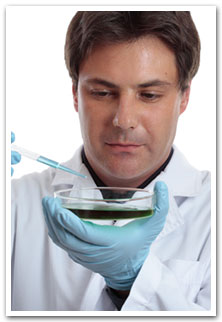Hi everyone!
A recent collaboration between NeoStem, Inc. and the University of Michigan has pushed the current research of adult stem cells, otherwise referred to as VSEL™ (very small embryonic-like) technology, into the spotlight. Studies to date from this partnership have indicated that human stem cells collected from adults have the potential to grow calcified connective tissue (the primary component of bones) in a laboratory setting. With further research it may also be revealed that the VSEL technology could potentially help with eliminating periodontitis (gum disease that damages bone) and the regeneration of bone after extractions and subsequent implant surgery. According to the NeoStem website, the first human clinical studies are set to begin at the University of Michigan very soon.
How it’s Done
Stem cells which occur naturally in bone marrow and other organs are collected from peripheral blood through apheresis. This process involves the removal of blood from a subject and separating the needed elements within the blood using an instrument similar to a centrifuge. Elements separated from the blood may include plasma or platelets.
Back to the Study…
Researchers have found that VSEL stem cells have similar properties to that of embryonic stem cells. This observation opens the possibility of stem cell use without the moral or legal complications that inevitably come with it. More importantly, it can provide a more minimally-invasive approach to accelerating the process of bone regeneration for dental patients who need implant surgery.
University of Michigan’s Research Team Leaders
For this first human clinical trial on dental bone regeneration, U-M’s research team leaders include Russell Taichman, professor of dentistry; Laurie McCauley, professor and newly named dean of the U-M Dental School; and Denis Rodgerson, director of grants and academic liaisons for NeoStem. The university’s involvement includes the design, patient care and data analysis in the overall study. NeoStem provides the cells and patented technology that purifies the extracted stem cells. The entire study is located at the Michigan Center for Oral Health Research and the University of Michigan’s Health System.
The hope of the research team is that they can recruit 50 patients within a year that will need a tooth extraction and a dental implant. Essentially, Dr. Taichman’s team will harvest the patient’s cells and with NeoStem’s VSEL technology mobilize and purify the stem cells before any tooth extraction takes place.
With this method, U-M’s research team can implant populations of the VSEL stem cells back into the subjects. Control patients will receive their own cells, while the others will receive stem cells synthesized with the VSEL technology. After the growth of new bone tissue, researchers remove a small portion for analysis and replace it with an implant. Taking advantage of the time between extraction and implant, Dr. Taichman’s team hopes to reveal whether or not adult stem cells with VSEL technology will expedite the healing time and perhaps, develop a higher quality of bone.
With NeoStem’s technology and the natural composition of human bone cells, scientists believe this combination of a higher concentration of cells placed upon a wound site, like a tooth extraction, will expedite much more rapid healing.
It is our hope that the limitless possibilities behind this type of stem cell research will have the potential to provide a better quality of service for our patients in the not-too-distant future. As a Michigan native, I couldn’t be more excited that my alma mater has taken this challenge into the forefront of stem cell technology for its use in a dental setting. At our Southfield Dental office, we make it a priority to keep our skills, knowledge, and technology, at the highest level. We’re just as involved in keeping up with cutting-edge treatments as we are with providing the gentlest, pain-free dental experience possible to every patient we see. Come see the difference for yourself at Dr. Mark Langberg DDS, MAGD.
Until next time,
Mark W Langberg, DDS, MAGD
248-356-8790
